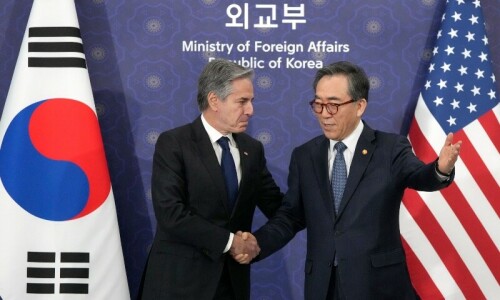 KARACHI, Sept 9: Overfishing and pollution continue to threaten marine resources and the livelihood of thousands of fishermen in the country as a weak surveillance network allows the owners of deep-sea trawlers to violate the relevant laws.
KARACHI, Sept 9: Overfishing and pollution continue to threaten marine resources and the livelihood of thousands of fishermen in the country as a weak surveillance network allows the owners of deep-sea trawlers to violate the relevant laws.
According to sources, about 300 million gallons daily (MGD) of untreated industrial and municipal waste is thrown into the Arabian Sea. They say that the fish catch has dropped by 70 per cent due to the abuse of tidal trap nets. “Though a ban has been imposed on the use of prohibited nets, the law is seldom implemented in Pakistan, otherwise it would not have been facing pollution of the worst kind.”
The ratio between land and sea pollution in Karachi is 1:10, say official sources. “The existing situation points to an alarming situation because of diminishing catch and extinction of several valued fish species over the years.”
Until 1971, jelly fish, a species highly sensitive to pollution, were abundant in Pakistan. They would stick to bottoms of ships and divers were needed to remove them. Today, jelly fish are found nowhere. Similarly, whales were sometimes found at Cape Montz, a beach at about 40km south-west of Karachi along the Arabian Sea, and on the border between Lasbella district of Balochistan and Karachi.
Cape Montz was once an estuarine area where the Hub River used to fall into the Arabian Sea. The freshwater discharge from the Hub River has been disrupted as a result of construction of the Hub dam. The river estuary thus remains mostly dry. It is only during heavy rainfall or flood season that the estuary has freshwater. Amazingly, dolphins once came into the Karachi Harbour, an official recalled.
The situation has changed, and for the worse. Manora Channel situated near Karachi Fish Harbour has lost oysters. There is a declining trend of fish catch of Palla (Tenualosa ilisha), Bombil (Harpadon nehereus), Bambore (Sillago Sihama), Dangri (Lates calcarifer) and Mallah (Letchrinus spp.) in Sindh, one of the most impoverished provinces of Pakistan, according to Aly Ercelawn, an independent economist.
More than 18,000 small fishing boats are registered with the Marine Fisheries Department in Karachi, at least 12,000 of them are operational along the 999-km coastal line.The adverse effect of prohibited nets is not the only danger to sustainable fishery. A greater threat is posed by deep-sea trawling. These trawlers have been combing the territorial waters of Pakistan for a long time, indulging in poaching and under-reporting, besides polluting the sea by throwing by-catch (unwanted species) into the sea.
Although deep-sea trawlers are supposed to operate beyond 35 miles of the coastal belt, a weak surveillance network and a corrupt bureaucracy tacitly allow the owners of these trawlers to violate the law.
As early as 1998, a report compiled by Save the Children Fund warned: “With overfishing, a looming problem, the livelihood of the fishing community was considered to be at risk. About 34 trawlers were fishing around the international water boundary, and they were creating immense problems for small and medium-sized fishing boats. If these practices were to continue, the entire fishing communities’ livelihood would shortly be at stake. Even at present many boats going out in the sea were coming back with small catch.”
Deep-sea trawlers have also been indulging in under-invoicing and under reporting. But the ban imposed on them has been lifted.
Suffering a shortage of foreign exchange, Pakistan is trying all options to boost its exports. Fishery happens to be an important sector in this regard.








































Dear visitor, the comments section is undergoing an overhaul and will return soon.